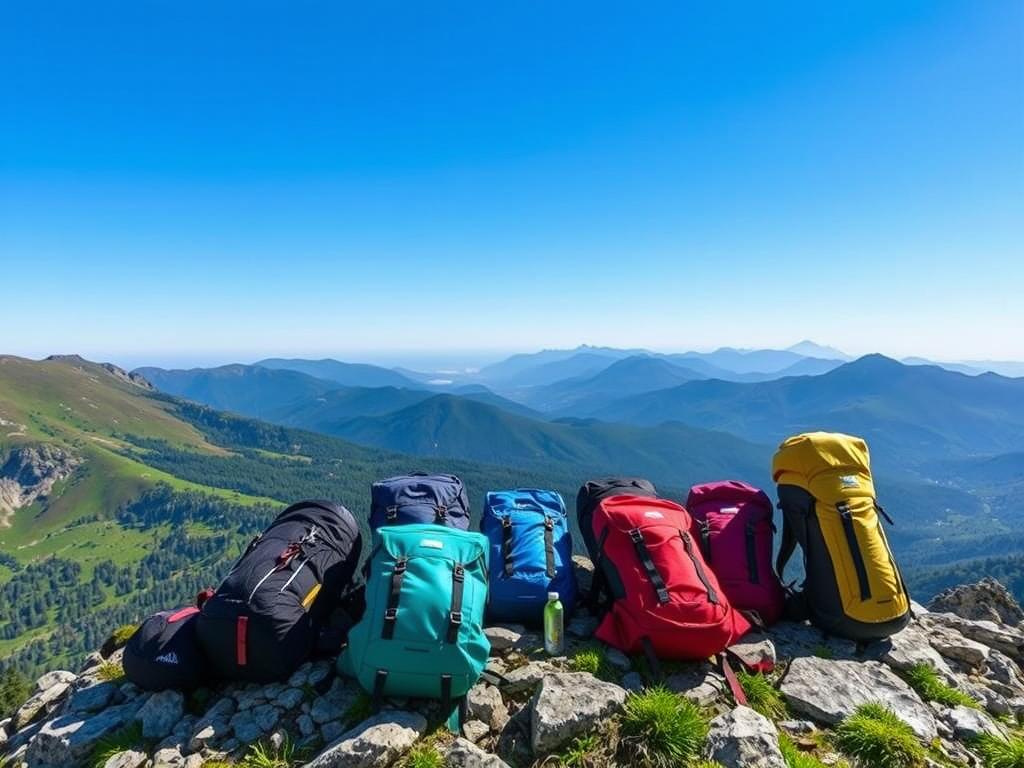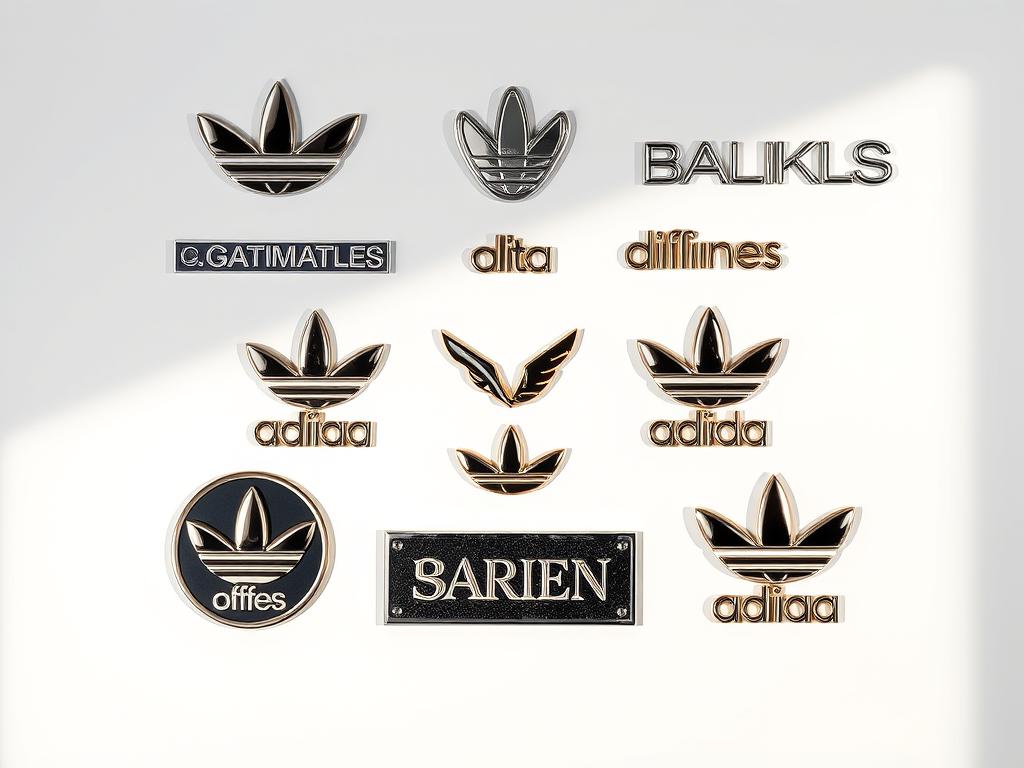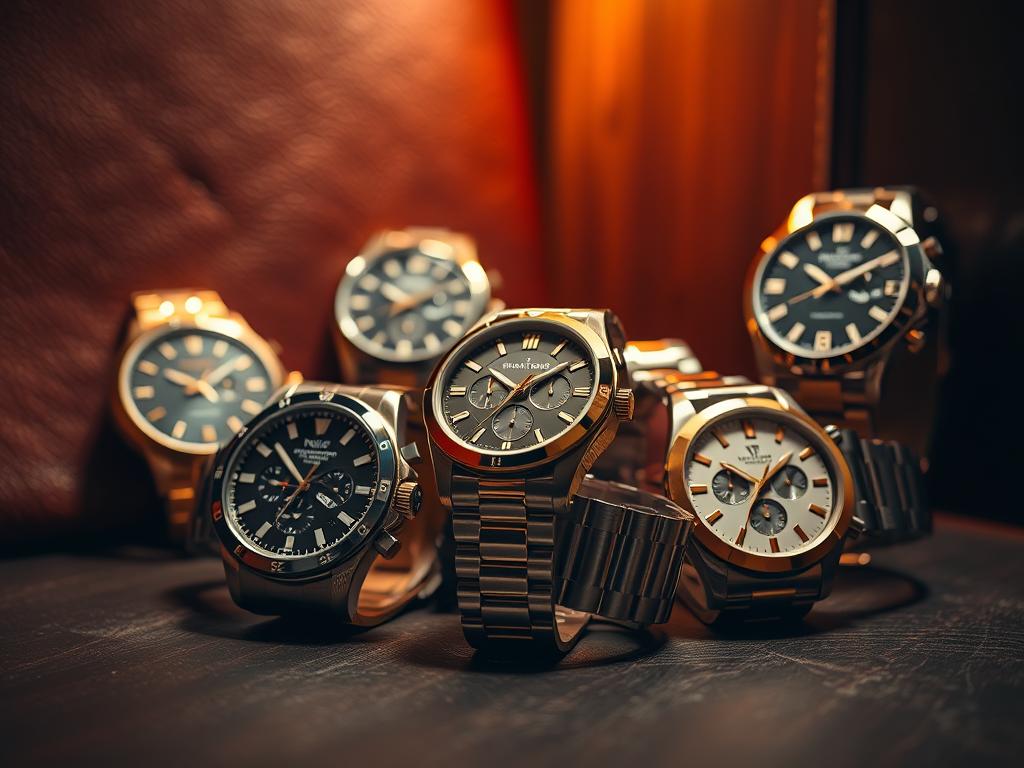Imagine standing at the trailhead, ready for a beautiful journey. The fresh mountain air fills your lungs. You adjust your pack, feeling its weight settle on your shoulders.
This is the moment every hiker dreams of – the start of an amazing adventure. But what if your pack felt like a feather? That’s what lightweight hiking backpacks offer.
These backpacks are changing how we explore the outdoors. They let us go farther and faster without getting tired.
Take the Gossamer Gear Mariposa 60, for example. It has a score of 93 and a comfort rating of 10.0. It’s very light, weighing only 32.6 ounces, but still has a lot of room.
Ultralight backpacking is becoming more popular. Hikers want to carry less weight. The market has many options, from the REI Co-op Flash 55 to the Hyperlite Mountain Gear Southwest 55.
These packs are strong and can carry up to 40 pounds. They’re comfortable to wear.
We’ll look at what makes lightweight backpacks special. We’ll compare brands and help you find the right pack for your adventure. Whether you’re a seasoned hiker or just starting out, there’s a pack for you.
Introduction to Lightweight Hiking Backpacks
Lightweight hiking backpacks have changed the outdoor world. They weigh 1-3 pounds. This lets hikers enjoy nature without heavy gear.
Backpack reviews praise their comfort, durability, and organization. They keep weight low.
Importance of Weight in Hiking Gear
The weight of your gear is crucial. Old backpacks weigh 50-60 pounds. This can cause fatigue and injuries.
Lightweight backpacking aims for 25-30 pounds total. This includes all you need. It lets you hike farther with less effort.
Benefits of Lightweight Backpacks
Choosing a lightweight backpack has many benefits:
- Less fatigue and more mobility
- Quicker hikes and longer distances
- Lower injury risk
- More fun outdoors
Ultralight fans aim for 10-15 pounds. This is for the best efficiency.
Choosing the Right Backpack for Your Needs
Finding the perfect backpack is key. Consider these factors:
- Capacity: Make sure it holds all your gear
- Fit: A good fit spreads the weight right
- Features: Look for things like water holders
- Material: Choose strong yet light materials
The right backpack makes hiking better.
Top Features to Consider
Choosing the right lightweight hiking backpack is crucial for a great outdoor adventure. As hiking trends change, gear makers keep innovating. Let’s look at the main features to find in your next backpack.
Material and Durability
Today’s backpacks are made from strong materials like ripstop nylon and polyester. These materials are durable and don’t weigh much. Brands like Conifer make tough gear for trails.
Suspension Systems
A good suspension system is key for comfort on long hikes. Aarn’s “Balance Packs” spread weight evenly, easing back and shoulder strain. Look for packs with padded straps and breathable back panels to stay comfy.
Storage Options and Capacity
Backpacks with many pockets and adjustable straps are very useful. Couloir’s alpine packs have special pockets for climbing gear. Most hikers prefer 40-60 liters of space. The Gossamer Gear Mariposa 60 is light, weighing 1.9 pounds, and has 60 liters.
Comfort and Fit
Comfort is essential for a good hike. Modern packs like the LiteAF Curve Full Suspension fit you just right. They weigh 1.5 to 2.0 pounds and hold 40-46 liters. The best backpack weight for hiking is now about 2 pounds, down from 5-7 pounds before.
Best Brands for Lightweight Hiking Backpacks
Choosing the right backpack is key for hikers. They want comfort and efficiency on the trail. Several brands offer top products that save weight without losing quality.
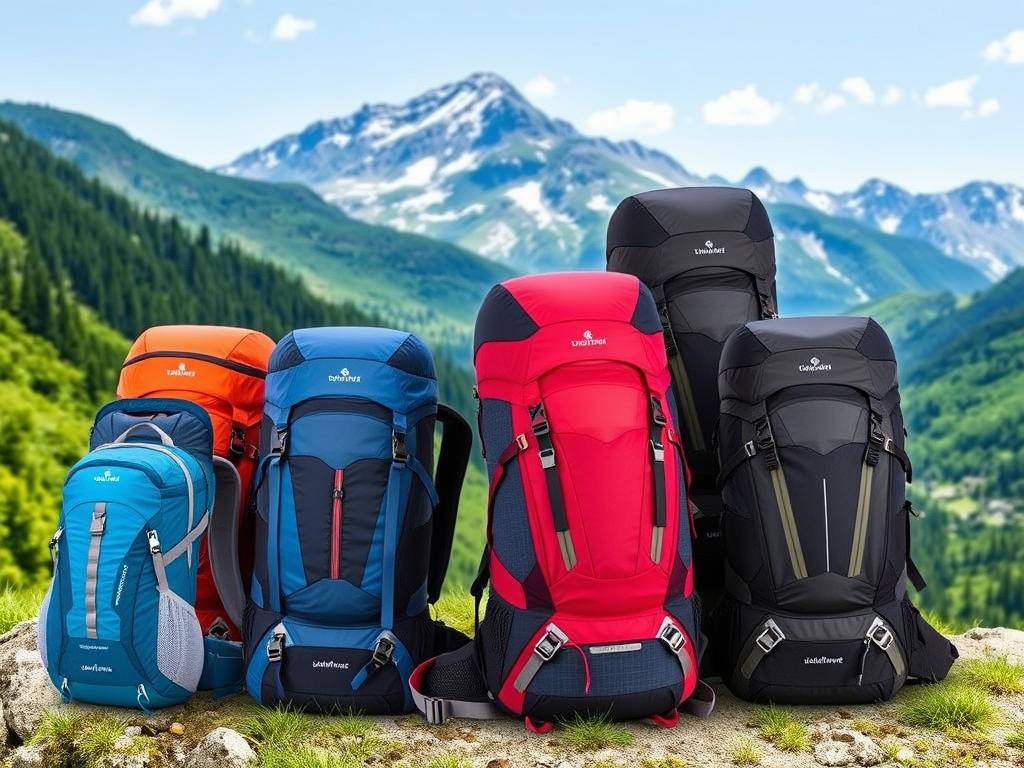
Osprey
Osprey is a leader with innovative designs. Their Exos 58 weighs just 2 lbs 13 oz and holds up to 40 lbs. The Atmos AG 65 is great for long hikes, but it’s heavier at 4 lbs 10 oz. Osprey is a top choice in backpack reviews.
Deuter
Deuter’s Aircontact Core 65+10 has lots of space for hiking gear. It’s not the lightest at 4 lbs 3 oz, but it supports heavy loads well. Deuter focuses on comfort and durability for tough terrains.
Gregory
Gregory’s Focal 48 is a good mix of light and useful. It weighs 2 lbs 11.5 oz. The Paragon 58 has more room without adding too much weight, perfect for those who need extra space.
REI Co-op
REI’s Flash 55 is light at 2 lbs 13 oz and has 55L capacity. It costs $199, making it a great value. REI’s brand is popular among those who want quality without spending a lot.
These brands offer high-quality backpacks for different hiking styles. Whether you want something ultralight or extra features, there’s a pack for you.
Comparison of Popular Lightweight Hiking Backpacks
Choosing the right backpack is key for a great outdoor trip. Let’s look at three top picks to find the best one for you.
Osprey Exos 58
The Osprey Exos 58 is great for staying cool and comfy. It’s light, weighing 2 lbs 10 oz. Perfect for those moving to lighter gear.
Its AirSpeed system keeps your back cool on long walks. It has 58 liters of space, great for longer trips.
Gregory Paragon 58
The Gregory Paragon 58 is a good mix of light and features. It’s a bit heavier at 3 lbs 9 oz. But it spreads the weight well.
It fits you just right with adjustable torso length. Plus, it has lots of pockets and easy access.
REI Flash 55
The REI Flash 55 is all about customization. It’s as light as the Exos, weighing 2 lbs 10 oz. You can remove parts to save up to 7 oz.
It’s a smart choice for those on a budget but want light gear.
When reading reviews, think about your hiking style and needs. The Exos is best for ventilation, the Paragon for organization, and the Flash for customization. All three are top choices for different adventures.
Budget-Friendly Options
Finding affordable lightweight backpacks for outdoor adventures is easy. Many options are great for hikers who want to save money. They don’t have to give up quality.
Affordable Lightweight Backpacks
The Teton Sports 55L Scout is a great choice for those on a budget. It costs $100 and holds 55 liters. It weighs 4.5 pounds, perfect for longer trips.
The Mountainsmith Scream 55 is another good pick. It costs $128 and is very light. It weighs only 2.8 pounds, making it a top choice for those who want to carry less.
Value vs. Performance
The REI Co-op Trailmade 60 is a good balance of value and performance. It costs $179 and holds 60 liters. It weighs 3.4 pounds, making it comfortable to carry.
It has a comfort rating of 7.5 and an adjustability rating of 8.0. This makes it a solid choice for those looking for quality without spending too much.
Where to Find Discounts
To save on hiking backpacks, check out sales at outdoor stores. Also, look for last season’s models. Online marketplaces often have great deals on hiking gear.
Some brands, like Six Moon Designs, offer coupon discounts. Their Minimalist V2 pack, usually $210, can be found for $189.90 with a coupon. This is a big savings on quality outdoor gear.
Lightweight Backpacking for Beginners
Starting a lightweight backpacking adventure is exciting. It’s a new way for outdoor lovers to explore. Knowing the basics is key for new hikers.
Essential Gear for New Hikers
Beginners should focus on three main things: a sleep system, shelter, and pack. These should weigh about 6.5 pounds together. Choose a backpack of 35-60 liters for long trips.
The Osprey Exos Pro 55L is a great pick for beginners. It weighs 33.2 ounces.
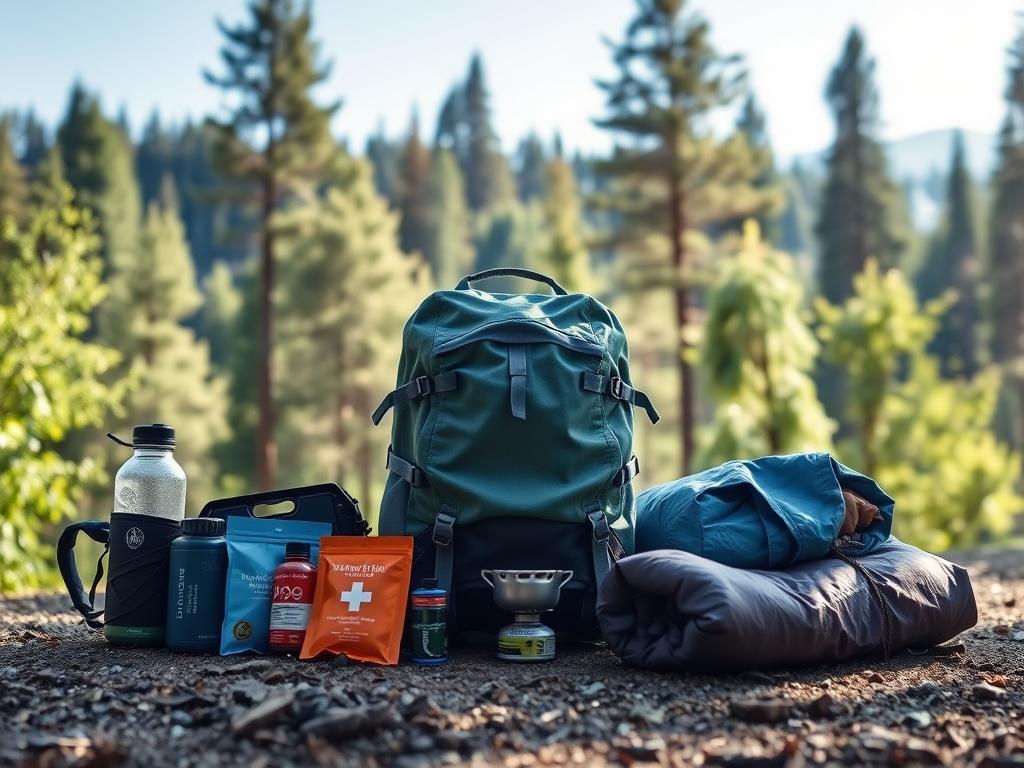
Packing Tips for Beginners
To pack light, follow these tips:
- Choose snacks like nuts and cured meats that are full of calories
- Think about using dehydrated meals or going stoveless
- Pick items that can do more than one thing to save weight
- After your trip, sort through your gear and get rid of what you don’t need
Common Mistakes to Avoid
New hikers often make these mistakes:
- Carrying too much “just in case” stuff
- Not checking the weather forecast
- Not wearing in new boots before a long hike
- Not drinking enough water
Lightweight backpacking is a learning journey. Start with a pack under 20 pounds. As you get better, you can make it even lighter. With time, you’ll find the right mix of comfort and efficiency on the trail.
Recommendations for Day Hikes
Day hikes need special outdoor gear. The right backpack is crucial. Let’s look at what makes a great day hiking backpack and some top picks.
Ideal Features for Day Hiking Backpacks
When picking a daypack, look for these:
- Lightweight design (under 2 pounds)
- Capacity between 20-30 liters
- Comfortable shoulder straps and back panel
- Hydration system compatibility
- Multiple pockets for organization
Top Picks for Day Hikes
Our 2025 review of 19 daypacks shows the best:
- Osprey Talon 22: Best overall, great comfort and versatility.
- REI Co-op Flash 22: Best value, only 14 ounces.
- REI Co-op Trail 25: Perfect for trail-to-town trips.
Packing Essentials for One-Day Adventures
Don’t forget these for your day trip:
- Water (aim for 2-3 liters)
- Snacks and lunch
- First-aid kit
- Navigation tools (map and compass)
- Sun protection
- Extra layer of clothing
Packing light is key for fun day hikes. Choose a backpack that fits you. Load it with the right gear for a safe, fun adventure.
Tips for Packing a Lightweight Backpack
Packing a lightweight backpack is key for modern hikers. Hiking trends now favor minimalism. Learning to pack efficiently makes your outdoor adventures better.
Organizing Gear Efficiently
Efficient organization is crucial for lightweight hiking. Use ultralight stuff sacks to group similar items. This can save up to a pound over traditional methods.
Put items you use often in easy-to-reach pockets. This way, you won’t have to keep unpacking and repacking.
Weight Distribution Strategies
Proper weight distribution is essential for comfort. Pack heavy items near your back and in the middle. This keeps your balance and eases muscle strain.
Lighter items should go at the top or in outer pockets. This helps keep your pack balanced.
Essential Items to Bring
When hiking, it’s better to have less. Choose multipurpose gear to cut down on weight. A lightweight down sleeping bag, for example, is just one pound.
It keeps you warm in temperatures as low as 20°F. This is much lighter than a 2.5-pound synthetic bag.
- Ultralight shelter (3-5 minute setup time)
- Compact first aid kit
- Lightweight, high-calorie snacks
- Versatile clothing layers
The goal is to keep your base weight under 20 pounds. For ultralight enthusiasts, aim for under 10 pounds. By choosing the right gear and packing smart, you can enjoy hiking more without losing comfort or safety.
Maintenance and Care for Your Backpack
It’s important to take care of your outdoor gear. This keeps it working well for a long time. Taking care of your backpack can make it last up to 10 years or more. This saves you money and keeps you safe on the trail.
Cleaning Your Backpack
Cleaning your backpack regularly is key. Different materials need different cleaning methods. For most, use a soft brush and a damp cloth for cleaning.
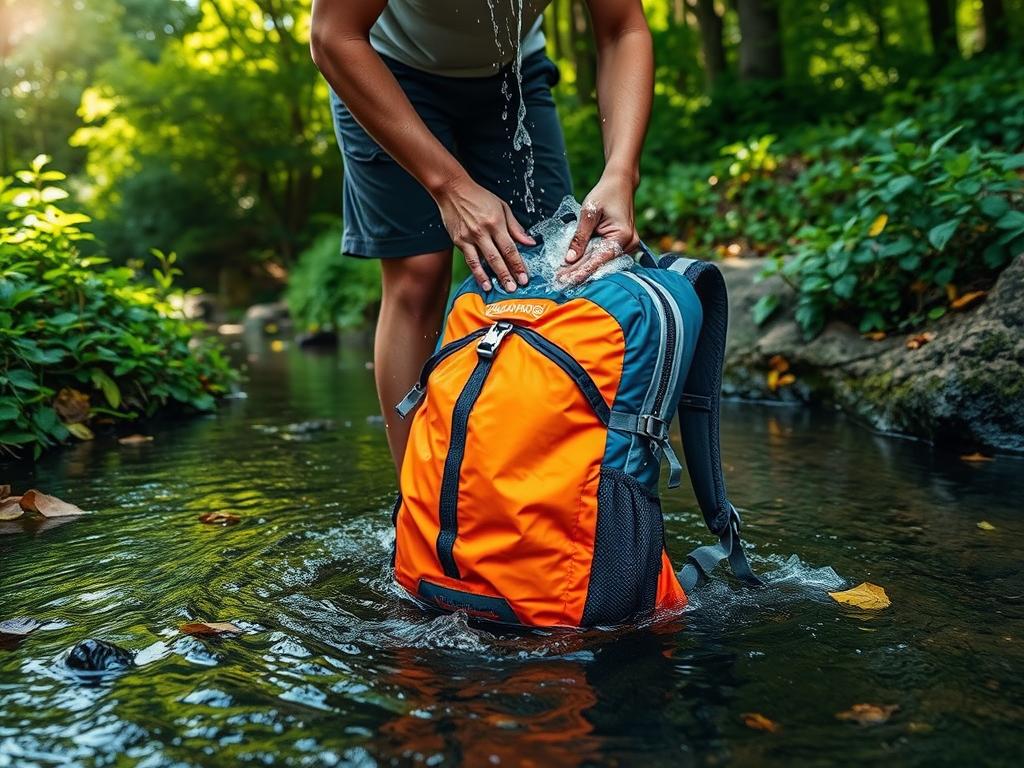
Storage Tips
Keep your backpack in a cool, dry place. Avoid direct sunlight. Hang it or store it upright to keep its shape.
Empty all pockets and leave zippers open. This stops mold from growing. For long storage, fill it with newspaper to keep its shape.
Repairing Minor Damage
Fix small tears right away to stop them from getting bigger. Use gear repair tape for quick fixes. For zipper problems, clean the teeth with a toothbrush and use silicone-based lubricant.
If you’re not sure how to fix it, get professional help. This keeps your backpack in great shape.
Proper care of your gear makes it last longer. It also makes sure it works when you need it. Regular checks after each hike help find and fix problems early. This keeps your backpack ready for the trail for years.
Reviews and User Experiences
Backpack reviews are key for hikers to make smart choices. The hiking world values real feedback on gear. Let’s see how user experiences shape trends and guide backpack picks.
Gathering Feedback from Hikers
Hikers share their stories online and in forums. They talk about durability, comfort, and how well gear works. For example, one user used the KS50 backpack for over 1,000 kilometers.
Importance of User Reviews
User reviews give insights beyond just specs. They show how backpacks do in real life. Hikers often point out surprises, good or bad. The Gossamer Gear Vagabond pack, for instance, got praise for its new water-resistant zippers.
Analyzing Customer Ratings
When looking at reviews, consider both numbers and words. Look for patterns in ratings from different places. Notice what features keep coming up. For example, the KS50 backpack can handle up to 15 kg, best at 10 kg.
Hiking trends change over time. Ultralight backpacks are becoming more popular. The Waymark Gear MILE pack is a good example, with its 28L capacity for day hikes and overnight trips. By studying user feedback, you can find the best backpack for your adventures.
Environmental Considerations
Eco-friendly travel is becoming more popular. Hikers are now choosing sustainable gear. The outdoor industry is coming up with new ways to lessen environmental harm.
Eco-Friendly Backpack Options
Backpack makers are using recycled materials. Pacsafe has been PVC-free for over 10 years. They use C0 (PFC-free) treatments now.
Econyl, made from old fishing nets, is also becoming popular. It’s a sustainable material.
Sustainable Brands to Explore
Many brands are working hard to be sustainable:
- Pacsafe: Plans to use more recycled or sustainable fabrics
- Osprey: Known for durable designs and repair programs
- Deuter: Focuses on making products that last long
Impact of Lightweight Gear on Nature
Lightweight gear can greatly reduce a hiker’s impact on nature. Here are some facts:
- Backpacking gear emissions: 36 gCO2e/mile
- Synthetic nylon emissions: 10 kg CO2e/kg
- Natural wool emissions: 32 kg CO2e/kg
Choosing lightweight, synthetic materials over heavier natural fibers can cut emissions. This fits with the trend of using ultralight gear. It’s good for both hikers and the environment.
Conclusion and Final Thoughts
The world of lightweight hiking backpacks has changed a lot. Now, outdoor lovers have many choices to make their hikes better. These lightweight hiking backpacks help by making hikes less tiring and more comfortable.
Summary of Key Points
Top brands make ultralight backpacks that weigh less than 2 pounds. They cost between $200 and $350. For example, the My Trail Co Backpack Light 50L is just $129 and weighs 33.5 ounces.
These backpacks use strong and durable materials like Dyneema threads.
Encouragement for Outdoor Enthusiasts
Switching to a lightweight backpack can really help hikers. There are many choices for different budgets and needs. When picking a pack, think about comfort, how much you can carry, and how long it lasts.
The Future of Lightweight Backpacking
Hiking trends are always changing, leading to new backpack designs. We might see even better materials, better weight distribution, and more ways to customize packs. Keeping up with these changes will help hikers enjoy their adventures even more in the future.
Notes
Best Lightweight Hiking Backpacks, When venturing into the great outdoors, a reliable and lightweight backpack is essential for a comfortable and enjoyable hiking experience. A good backpack should provide ample storage space while keeping your weight down to a minimum, allowing you to hike farther and longer without fatigue.
Key Features to Consider, When selecting a best lightweight hiking backpack, there are several key features to consider, including its capacity, material, suspension system, pockets, and hydration compatibility. Look for a backpack with a capacity of at least 30 liters to ensure it can hold all your gear while keeping you comfortable on the trail.
Top Picks for Lightweight Hiking Backpacks, Some popular options for lightweight hiking backpacks include the Osprey Talon 22, the REI Co-op Trail 25, and the Salomon Quest 4D 32. These packs offer a great balance of weight, capacity, and features while providing a comfortable carry system and durable materials.
Hydration System Compatibility, A hydration system is a must-have for long hikes or backpacking trips. Look for a lightweight hiking backpack with a built-in hydration sleeve or compatibility with popular hydration systems like CamelBak or Platypus.
Weight Distribution and Comfort, The weight distribution and comfort of the backpack are crucial factors to consider when selecting a best lightweight hiking backpack. A comfortable and well-designed suspension system will help distribute the weight evenly, reducing fatigue and discomfort on the trail.
Additional Hiking Essentials, Besides a good backpack, there are several other essential items to pack for your hike, including a water bottle or hydration bladder, snacks, first aid kit, map and compass, extra clothes, headlamp, and personal safety items like bear spray or pepper spray.
Backpack Size Options, Backpack size options vary depending on the length of your trip and the amount of gear you need to carry. Common backpack sizes for hiking include 20-30 liters, 35-40 liters, and 50-60 liters, each offering a different balance of weight, capacity, and comfort.
Trekking Pole Compatibility, Trekking poles can be a valuable asset on long hikes or difficult terrain. Look for a lightweight hiking backpack that is compatible with trekking poles, providing a secure attachment system and keeping your gear organized.
Packing Strategy and Organization, A well-packed backpack is essential for a comfortable and enjoyable hike. Develop a packing strategy that includes layers of clothing, a first aid kit, and a balance of essentials and comforts to keep you fueled and hydrated throughout the day.
Compression Straps and Organizer Pockets, Compression straps and organizer pockets are useful features to consider when selecting a lightweight hiking backpack. These allow for adjustable compression and organization, helping to keep your gear secure and within reach on the trail.
FAQ
Q: What are the main benefits of using a lightweight hiking backpack?
A: Lightweight hiking backpacks help you hike longer without getting tired. They make moving easier and more fun. This way, you can explore more without feeling worn out.
Q: How do I choose the right lightweight backpack for my needs?
A: Think about how much you’ll carry and how long you’ll hike. Also, consider your body type. This helps find a backpack that fits you best.
Q: What are some top brands for lightweight hiking backpacks?
A: Osprey, Deuter, Gregory, and REI Co-op are top picks. They offer many options for different hiking styles.
Q: Are budget-friendly lightweight backpacks reliable?
A: Yes, many affordable backpacks are reliable. They might not have all the fancy features, but they work well. Always check reviews to find the best deal.
Q: What are the essential features to look for in a lightweight hiking backpack?
A: Look for strong materials and good suspension. Also, check the storage and fit. Adjustable straps and ventilation are important too.
Q: How do I properly maintain my lightweight hiking backpack?
A: Clean it often and store it in a cool, dry place. Fix small problems quickly. Follow the care instructions for the best results.
Q: What are some eco-friendly options for lightweight hiking backpacks?
A: Eco-friendly backpacks use recycled materials or sustainable fabrics. Look for brands that care about the environment.
Q: How important are user reviews when choosing a lightweight hiking backpack?
A: User reviews are very helpful. They share real experiences with the backpack’s quality and comfort. Mix expert opinions with user feedback for the best choice.
Q: What are the key differences between backpacks for day hikes and multi-day trips?
A: Day hike packs are smaller, for carrying essentials. Multi-day packs are bigger, with more storage and support for longer trips.
Q: How can I efficiently pack a lightweight hiking backpack?
A: Pack heavy items near your back and in the middle. Use sacks and cubes to save space. Choose essential items and multi-use gear to lighten your load.
Source Links
- https://www.outdoorgearlab.com/topics/camping-and-hiking/best-ultralight-backpack – The 6 Best Ultralight Backpacks
- https://www.switchbacktravel.com/best-ultralight-backpacks – Switchback Travel | Best Ultralight Backpacks of 2025
- https://hyperlitemountaingear.com/blogs/the-trailhead/introduction-our-case-for-ultralight-backpacking?srsltid=AfmBOor0oHC2GRwjVmWR-bHr8j6f27BJimCsrt9M3k-Jjjs3vt5RluZu – INTRODUCTION: OUR CASE FOR LIGHTWEIGHT BACKPACKING
- https://lastingadventures.com/blog/the-basics-of-ultralight-backpacking/ – The Basics of Ultralight Backpacking – Lasting Adventures | Top-Rated Guide Services
- https://sectionhiker.com/lightweight_hiking/ – Intro to Lightweight Backpacking – SectionHiker.com
- https://lighthikinggear.com/blogs/hiking/the-ultimate-guide-to-choosing-the-perfect-hiking-backpack?srsltid=AfmBOorrkQmgo0gNgJy2o0YdqUo84feFYsQp_5ODvgeDC_PMu65FfSqx – The Ultimate Guide to Choosing the Perfect Hiking Backpack
- https://www.treelinereview.com/gearreviews/best-lightweight-backpacking-backpacks – Best Lightweight Backpacking & Thru Hiking Backpacks of 2024
- https://gearjunkie.com/packs/best-ultralight-backpacks – The Best Ultralight Backpacks of 2025
- https://www.cleverhiker.com/backpacking/best-backpacking-backpacks/ – Best Backpacking Backpacks of 2025
- https://thetrek.co/best-backpacking-backpacks-for-thru-hiking/ – The Best Backpacking Backpacks for Thru-Hiking in 2025 – The Trek
- https://seekoutside.com/blog/comparing-our-lightweight-backpacking-and-hiking-backpacks/?srsltid=AfmBOorOicDC95KKISQRfBhFAkopANvs4CA4eAmDaMSKdKEjTdOM7z8w – Comparing Our Lightweight Backpacking and Hiking Backpacks
- https://www.fieldmag.com/articles/lightweight-vs-traditional-hiking-backpacks – Lightweight vs Traditional Hiking Backpacks: A Comparison Guide
- https://www.outdoorlife.com/gear/best-backpacking-backpacks/ – The Best Backpacking Backpacks, Tested and Reviewed
- https://www.outdoorgearlab.com/topics/camping-and-hiking/best-budget-backpacking-pack – The 4 Best Budget Backpacking Packs of 2025
- https://mylifeoutdoors.com/2022/06/high-quality-and-affordable-ultralight-loadout.html – High-Quality and AFFORDABLE Ultralight Loadout – My Life Outdoors
- https://bikehikesafari.com/best-lightweight-hiking-backpacks/ – 14 Best Ultralight Backpacks for Backpacking [2025] BikeHikeSafari
- https://www.garagegrowngear.com/blogs/trail-talk/best-ultralight-backpack-ul-pack?srsltid=AfmBOopCJd0UoK9tfmZ3dOfpKIYECDIcgA3WTFqb92NJUl9wsrMRtH1Q – Best Ultralight Backpack? Let’s Dive Into a Thru-Hiker’s Gear Closet!
- https://www.garagegrowngear.com/blogs/trail-talk/how-to-go-ultralight-backpacking?srsltid=AfmBOorbsEsZ3w4Twr7sD-HPCKY1kiExQ-Q83-ri2LXNzn0Vl_60cStl – How to Go Ultralight Backpacking
- https://www.switchbacktravel.com/best-daypacks-hiking – Switchback Travel | Best Daypacks for Hiking of 2025
- https://www.outdoorgearlab.com/topics/camping-and-hiking/best-daypack – The 5 Best Hiking Daypacks of 2025
- https://backpackinglight.com/forums/topic/recommendations-for-a-day-pack/ – Recommendations for a day pack? – Backpacking Light
- https://hyperlitemountaingear.com/blogs/shakedown/never-not-learning-how-to-pack-light-for-backpacking-with-mike-st-pierre?srsltid=AfmBOoqDzaur4X_7svZxckaaDXLKZEGtPfy7wZdtzxAq8qJw7lZn9Za5 – Never Not Learning: How to Pack Light For Backpacking with Mike St. Pierre
- https://hyperlitemountaingear.com/blogs/on-the-trail/adventure-alan-s-complete-ultralight-backpacking-guide-for-beginners?srsltid=AfmBOopRv0Cs1gJ0aAoH01_H_hP7DBBlKS3PrL_wj1Xh6DVTE6LKZo2_ – Adventure Alan’s Complete Ultralight Backpacking Guide For Beginners
- https://www.garagegrowngear.com/blogs/trail-talk/how-to-go-ultralight-backpacking?srsltid=AfmBOoqvmC64yd2ObRSzXexK4JDwB-fQLMyhvXZb0myl_dj2-qXnFYIN – How to Go Ultralight Backpacking
- https://thetrek.co/how-to-preserve-maintain-backpacking-gear/ – The Ultimate Guide for Maintaining Your Backpacking Gear
- https://hike.co.nz/essential-cleaning-tips-to-prolong-your-hiking-backpack/ – Essential Cleaning Tips to Prolong Your Hiking Backpack – Hiking In New Zealand
- https://www.garagegrowngear.com/blogs/trail-talk/best-ultralight-backpack-ul-pack?srsltid=AfmBOop_5bGaryit-ax0F7FtWG85zGIFjakAotI_XgoUveDWYtL4QAqz – Best Ultralight Backpack? Let’s Dive Into a Thru-Hiker’s Gear Closet!
- https://ridgelineimages.com/equipment/long-term-review-ks-ultralight-gear-ks50-backpack/ – Long-Term Review: KS Ultralight Gear KS50 Backpack
- https://pacsafe.com/blogs/pacsafe-blog/environmental-considerations-when-making-a-backpack?srsltid=AfmBOor1nE-eJU41tsCyeaLbqRKs_GZhTScWJb29nSddhA9gbUqyzx2Q – Environmental Considerations When Making a Backpack
- https://www.trailpeaches.com/backpacking-environmental-impacts/ – The Environmental Impact of Backpacking <
- https://thetrek.co/gear-review-my-trail-backpack-light-50l/ – Gear Review: My Trail Co Backpack Light 50L – The Trek
- https://backpackinglight.com/forums/topic/3563/ – Expert Answers How Safe is Ultralight Hiking? – Backpacking Light
